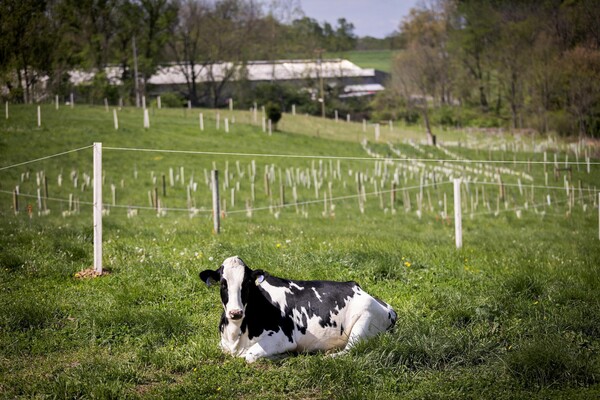
Image: Andriy Onufriyenko via Getty Images
There’s this idea in linguistics called sociolinguistic borrowing, in which one group of people adopts a feature of another group’s dialect. Usually it results from a positive association with the group that originally used the feature. But Betsy Sneller, a fifth-year Ph.D. linguistics student at the University of Pennsylvania, discovered something different.
In fieldwork on one South Philadelphia block, she found that those doing the borrowing actually espoused negative views about those from whom they borrowed. She teamed up with Gareth Roberts, an assistant professor in Linguistics, to further investigate this phenomenon experimentally in the lab.
“It wasn’t just this coincidental opposition,” Roberts said. “It was the ones who were most aggressively negative doing it the most.”
“This is pretty unusual,” Sneller added.
Sneller and Roberts presented their work at the Annual Meeting of the Linguistic Society of America in January and recently submitted a paper on the topic for potential publication.
The research originated as Sneller’s fieldwork for Linguistics 560, “The Study of the Speech Community,” which, for more than four decades, has contributed to the Philadelphia Neighborhood Corpus. Students select a small cross section of town, make initial contacts on the block, then use a “snowball” method to reach others, asking those first people for recommendations. To date, the corpus includes more than 50 studies and more than 1,000 recordings.
“We like to say it comprises 100 years of sound change. The idea is that, if you interview somebody, by the time she’s 20, she basically speaks the way she’s going to speak,” Sneller said. “So, if I interviewed somebody who is 90 years old, I’m getting a sort of snapshot of what the language sounded like 70 years ago.”
“With fingers crossed that that person’s language hasn’t changed too much,” Roberts added.
Sneller and her peers headed to a South Philly block, eventually conducting sociolinguistic interviews with a small sample of 13 people. They began with simple questions to get subjects speaking as close to their typical language as possible.
“If they said they went to Catholic school, a follow up to keep people talking is, ‘Do you have any nun stories?’” Sneller explained. “Really we want people to tell us about their lives because that affects how they use language, and we also want them telling stories so they’re no longer paying attention to how they’re saying something but rather what they’re saying.”
The interviews revealed a unique case of linguistic borrowing.
As the demographics of this neighborhood started changing in the 1970s, old and new residents almost never interacted and, when they did, it was antagonistic. Yet Sneller noticed that white speakers had picked up a linguistic trait from their African-American neighbors. This feature is called TH-fronting, or pronouncing the “th” sound as an “f” instead. This exists in many versions of English across the world, including in the United Kingdom; within the U.S., it is a feature that can be found in African-American English.
Sneller hypothesized that speakers there subconsciously borrowed TH-fronting because, for them, it had come to be associated with positive characteristics like toughness and street smarts, linked with traits rather than one specific group of people.
To test the theory, Sneller and Roberts turned to a method Roberts had previously employed to determine under what conditions new dialects emerge: constructing artificial languages in a lab and having people use them in controlled scenarios.
In this particular game, participants took on personas of one of two alien species, Burls or Wiwos, the former of which was intentionally designed to look and sound tougher. Each species used the same made-up 12-word language, but one species had “b” where the other had “f.”
Four participants — two Burls, two Wiwos — learned the alien languages and played a series of rounds against one another. The winner was the one with the most resources at the end, garnered by trading or challenging others to fights.
“If challenged, you could either fight or run away. If you ran away, you dropped some stuff and your competitor got what you dropped,” Roberts said. “You’re better off running away than losing a fight, and you’re better off scaring someone away than winning a fight.”
Before deciding what to do, players could chat casually, and that’s the part Roberts and Sneller observed. As with the sociolinguistic interviews Sneller conducted during fieldwork, the back-and-forth conversations offered more insight into each Burl or Wiwo’s thinking than who actually won the fights and the game as a whole. The researchers found that, in a context where toughness mattered, all Wiwos borrowed features from Burls, but how much depended on the species of the addressee.
They next wanted to know what happened when they took away that context. So in a follow-up experiment in the lab, Roberts and Sneller removed the ability for Burls and Wiwos to fight, and the effect essentially disappeared.
“When toughness doesn’t matter anymore, the Wiwos aren’t borrowing the trait, which is kind of surprising, and it’s a beautiful parallel to the real world,” Sneller said. “For example, I know that TH-fronting exists. It has associations with toughness, but in my life toughness doesn’t have an important practical meaning, and so I’m less likely to borrow it. For the participants in the fieldwork I was doing, being interpreted as tough was important to their livelihood, so they were adopting it.”
For both Roberts and Sneller, this research falls into a broader catalog of work looking at how languages and dialects change and interact. For instance, some people think identity factors might accelerate the emergence of new dialects, while others argue these factors play little role. Earlier work by Roberts found support for the former position. His latest research, in its early stages, focuses on the dynamics of language, rather than dialect.
“Some of what we’re talking about is not just true of language,” Roberts said. “Language is a marker of identities operating in a constellation with all sorts of other cultural behaviors.”
Michele W. Berger

Image: Andriy Onufriyenko via Getty Images

Four women street vendors sell shoes and footwear on a Delhi street.
(Image: Kannagi Khanna)

nocred

nocred